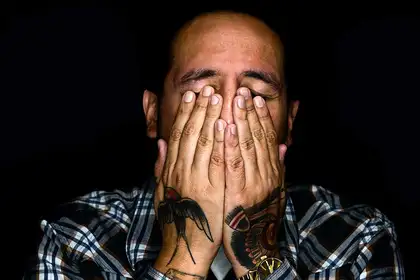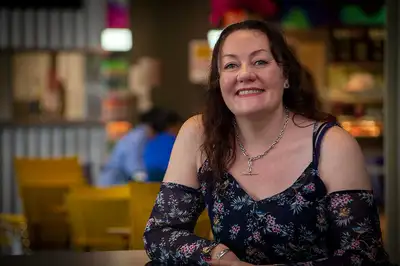
A sense of anxiety about the new COVID-19 variant in recent community cases is normal (photo:Ayo Ogunseinde/Unsplash)
As news of a community case hit the headlines, the familiar feelings of trying to mentally prepare for the looming news conference and potential of a lockdown started. As we enter a very sudden lockdown with new cases already emerging, the balance between calmness and acceptance alongside making sacrifices, taking precautions and being vigilant begins again, says clinical psychologist Dr Kirsty Ross.
We have watched the situation in New South Wales over the past few weeks with concern and an awareness that COVID-19 has changed again, to an adversary that continues to be a sneaky and evolving threat. We have had a long period of normality, and a level of complacency had definitely occurred for most of us. The habits that served us so well previously no longer seemed as important and had slipped – location scanning being a key one.
It is difficult to maintain a health behaviour in the absence of any clear need – not having any community cases for such a long time meant that the risks seemed very low, and ‘over there’, happening in other countries, not here. We rightly watched the Bledisloe Cup rugby game in a packed stadium with pride and a feeling of ‘we got this beat’. And it’s really important that we keep remembering that we do have this. We are experienced warriors in this fight; we have just let our training and preparation slip a bit!

Making space for all of our emotional responses to the latest lockdown is important, says Dr Kirsty Ross
Riding the waves of our emotional responses
All emotional responses to this new lockdown are understandable and have a role to play. Emotions are pieces of information that we can make room for. Some people are relieved that the anticipation of another lockdown is over as it is actually here now and we can deal with it, rather than waiting for the expected change in status that many have been anticipating.
For some people, there is likely a sense of anxiety about the new variant and the potential for significant disruption and impact. Anxiety gives us motivation to take action to meet a threat – whether that is to freeze (stay at home), fight (take the steps we need to around personal hygiene mask wearing, scanning) or flight (avoid any situations that incur unnecessary risks). Anger gives us energy to meet the extra demands of lockdown – in our jobs, in our relationships, in managing our own personal needs. Sadness helps us remember the things we value that may be blocked right now due to lockdown – and this information helps us to connect with and preserve those parts of our life. Taking time to notice moments of happiness is really important to help us remember that there are always positives to appreciate in the face of challenges.
Making space for all emotions is crucial – emotions do not last, and so riding the wave of those feelings and allowing them to pass means that we can mindfully identify how we are feeling, share our feelings with others to strengthen understanding and connection, and also wait for our emotions to settle before we decide what we need to do in a situation.
Acting when you are highly emotional is often not the best plan – taking time to feel calmer means you can think through more solutions, and you are more likely to choose to act in a way that moves you towards your goals and will feel more satisfying and productive. Knowing that we are all going to be more emotional means it is totally fine to take some time to answer that work email that really irritated you, to go for a short walk rather than impose a harsh consequence on your kids who have been talking non-stop while you have been trying to get some work done, and to take a deep breath before you reply to a request from your partner or family member that seems unreasonable in the moment.
Take care of yourself and those around you
It is important to recognise that your stress levels are going to be elevated right now and those are exactly the circumstances where we need to take the most care of ourselves, and take time to respond to the people that we care about. Making space for all emotions and recognising they are all valid is important – they will pass, others are entitled to their emotional experience (whether you share it or agree with it) and allowing yourself to feel what you feel without having to act on it means that you can make decisions that enhance your physical health, mental wellbeing and relationships.
Remember we have done this before, and we have the skills, knowledge and experience to do it again. Take one step at a time, one day at a time. This is an unfolding situation and trying to plan too far ahead will just bring about worrying thoughts and uncertainty that will drain your energy to manage your emotions today, and get in the way of you doing the things you need to do in the moment.
Fuel your body, mind and spirit while we face this new challenge and figure out exactly what it involves and means. Do the essentials, add in something that gives you a sense of achievement and something that gives you a sense of pleasure, and stay connected to what is important to you. Set your expectations of yourself and others realistically low – good enough is enough right now!
It’s been a while since we had to take this level of care; but, just like riding a bike, we can quickly get back into the behaviours we need to do for our, our family and our community’s protection. Keep in mind the bigger picture and that our individual actions contribute to a much bigger and more powerful national response.
What you do counts; if we each do our bit, we will deal with this situation as quickly and as effectively as possible. Keep in mind that you may not feel in control of what is happening in our country right now, but we do have control over our choices, behaviour and the way we respond emotionally.
Be kind to yourself, make space for all the feelings that this latest development brings, and try to stay in the moment. As a famous quote from Buddha says “Don’t try to calm the storm; calm yourself; the storm will pass.”